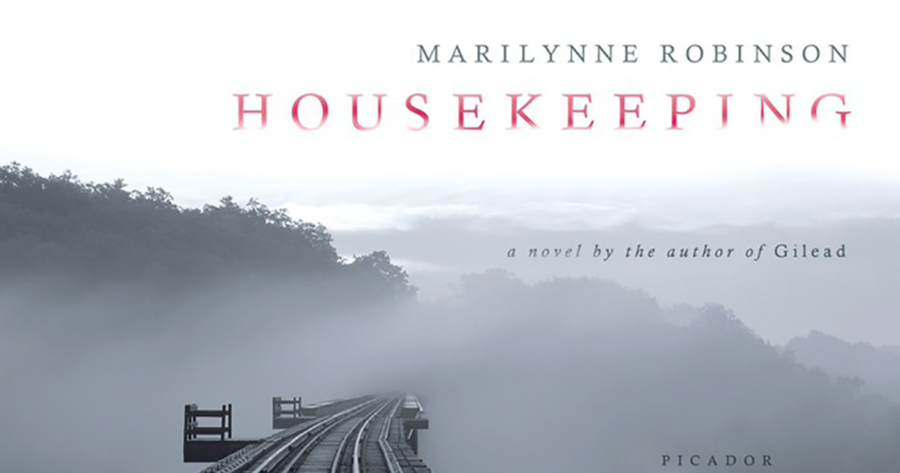In a 2009 interview with Rebecca Painter, Marilynne Robinson responded to the question of loneliness in the religious life saying: “I am not sure religion is meant to assuage loneliness. Who was ever lonelier than Jesus? ‘Can you not watch with me one hour?’ I think loneliness is the encounter with oneself—who can be great or terrible company, but who does ask all the essential questions. There is a tendency to think of loneliness as a symptom, a sign that life has gone wrong. But it is never only that. I sometimes think it is the one great prerequisite for depth, and for truthfulness.” Marilynne Robinson is generally known for her modern masterpiece, Gilead; however, it is her first novel, Housekeeping, which has, as if by some mystical inner gravity, drawn me back again and again.
Entrusted to the care of their grandmother after the suicide of their mother, Ruth and Lucille come of age in the small Northwestern mountain town of Fingerbone. The sisters’ upbringing is punctuated by various chapters of ‘housekeepers’: first their grandmother, then their great aunts, and– finally– their aunt Sylvie, a transient. Told through the eyes of Ruth, Robinson offers a sustained meditation on life, loss, loneliness, and the way to hope.
In Housekeeping loneliness emerges in the recognition of absence and loss that surrounds us. In recounting her family history, Ruth imagines a time when her “grandmother must have carried out a basket of sheets to hang in the spring sunlight, wearing her widow’s black” when the scent from a sudden gust of wind coming off the lake reminds her of “the small, scarce, stemmy flowers that she and Edmund would walk half a day to pick, though in another day they would all be wilted” (Robinson, 16). Ruth dives into a detailed and imaginary description of her grandparents hiking through the wilderness in search of these “rare things” sprouting out of “ants’ nests and bear dung” among “the ruins of a porcupine” and other creatures (16). Speaking as if from the mind of her grandmother, Ruth dreams of how her grandmother might have imagined her husband, as a wild man dressed in the skins and feathers and bones of animals, “more alarming than all the death whose trophies he wore” (17). Not only does the gust of the wind off the lake remind Ruth’s grandmother of her late husband’s absence, but the memory of their search for wildflowers is riddled with imagery relating temporality, decay, and death. In the imagination of Ruth, however, her grandfather handles the passing of things as any other ordinary thing: “This is death in my hand, this is ruin in my breast pocket, where I keep my reading glasses” (17).
Ruth’s attention shifts, returning to the image of her grandmother, clothed in widow’s clothes, pinning up laundry:
So the wind that billowed her sheets announced to her the resurrection of the ordinary. Soon the skunk cabbage would come up, and the cidery smell would rise in the orchard, and the girls would wash and starch and iron their cotton dresses. And every evening would bring its familiar strangeness… And she would feel that sharp loneliness she had felt every long evening since she was a child. It was the kind of loneliness that made clocks seem slow and loud and made voices sound like voices across water. Old women she had known, first her grandmother and then her mother, rocked on their porches in the evening and sang sad songs, and did not wish to be spoken to. (17-18)
In the same way that the wind recalled the season of white wildflowers and Edmund to her grandmother, the wind bears a sense of the life brimming in the immediate present: the skunk cabbage, the orchard, the chores. But even the present suffers under the pressure of time. As the day ebbs into evening, even the ordinary patterns and practices of life grow strange in the recognition of their fragility and inevitable passing. The children will grow up and leave home. The apples will rot. The cabbage will wilt. At once, all that is familiar becomes strange in the knowledge of unavoidable and imminent estrangement– whether by distance, or decay, or death. Ruth imagines her grandmother, even as a child not having yet experienced any significant loss, sensing the dissolution of things under the slow ticking of clocks.
Even before Ruth introduces the death of loved ones experienced in her own lifetime, she presents loneliness as common to all– even felt by those who have been spared the tragedy of unforeseen loss. Though loneliness is a fact of human existence, recognized by all regardless of experience, Robinson’s Housekeeping conveys two ways of living in response to this reality through the characters of Lucille and Ruth. Whereas Lucille decidedly resists loneliness through her attempts to secure permanence and security in house and society, Ruth follows Sylvie out of house and into a life of transience, embracing the decay, fragmentation, and death of things– including her own self. Though Ruth renounces the stability of a house to live as a lonely transient with Sylvie, Ruth is not oppressed into hopelessness. Instead, by choosing the life defined by the reality of loneliness Ruth undergoes a transformation enabling her to perceive the depths of truth and find hope for a future in which all things will be knit up, recollected, and reunited.
To recognize the inescapable passing of the world is to commit oneself to a life of loneliness. Yet, it is from within this loneliness that the mysterious presence of a future in which all is restored is felt most. Ruth, absorbed in the vision and contemplation of a ruined house, does not notice the abrupt withdrawal of Sylvie. In this final experience of abandonment, Ruth senses the nearness of those wild and lonely children who haunt this place– the feeling of their presence just behind her is not new. But now, there is no company to separate them from each other. In past times, when she wandered the wilderness with Lucille, the companionship of her sister was like “sitting at night in a lighted house,” but now that she is alone there is “neither threshold nor sill between me and these cold, solitary children” (154). Communing among the hidden children without ever making contact, Ruth learns loneliness to be “an absolute discovery,” a reality unqualified and unmitigated by what we have or do not have since all will inevitably perish (157). Not only does Ruth accept this as true of the world, but as also true regarding herself. She concludes that, “It is better to have nothing” and even embraces the thought of death without fear: “Let them come unhouse me of this flesh, and pry this house apart” (159). When Sylvie returns, Ruth no longer speaks of the cold or her hunger, but instead of the children who hid from her– her words aching with the strain of desire. Ruth’s journey across the lake to the abandoned homestead with Sylvie has changed her; she has ‘discovered’ what it is to be lonely and now cannot imagine being otherwise.
They return to the house, but the inhabitants of Fingerbone notice Ruth’s change and see how her habits conform to Sylvie’s and fear for her. The efforts of the goodwilling neighbors and upstanding citizens to keep Ruth “safely within doors,” however, fails to reverse the transformation that has unfolded since Ruth’s revelation of loneliness (183). They presume, as they do with all transients, that Ruth desires the comfort of home that Sylvie has failed to offer. But Ruth, having felt the deepness of loss in loneliness as well as the taste of fulfillment in the practice of longing, renounces them. Even if she were offered every earthly blessing, Ruth, like all other transients could find “nothing here to sustain” her (184). In embracing the lonely life of the ‘unhoused,’ Ruth learns “that hunger has its pleasures”– that our senses expand to feel the presence of those who are absent and to possess the assurance of their return (204).
Robinson’s Housekeeping concludes with Sylvie and Ruth secretly escaping from Fingerbone by crossing the railway bridge over the dark lake completing Ruth’s conversion into a transient. Ruth’s progression throughout the novel demonstrates the possibilities of spiritual loneliness. Through these moments of ‘unhousing,’ Ruth’s perception of life and loss become perfected to the point of perceiving that persistent presence only known in the deepest of longing. In stepping into the transient life, a life defined by loneliness, dispossession, and desire, Ruth’s ultimately discovers a hope for the resurrected life.




Leave a Reply
Your email is safe with us.